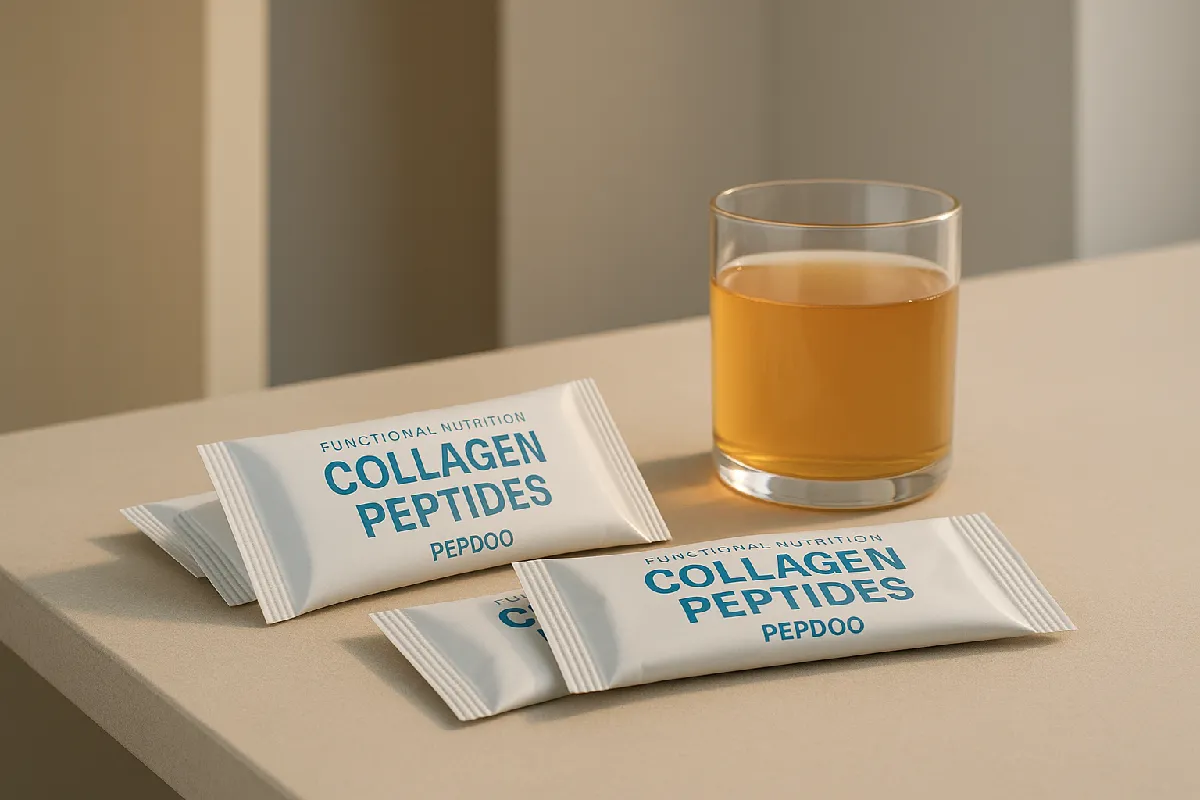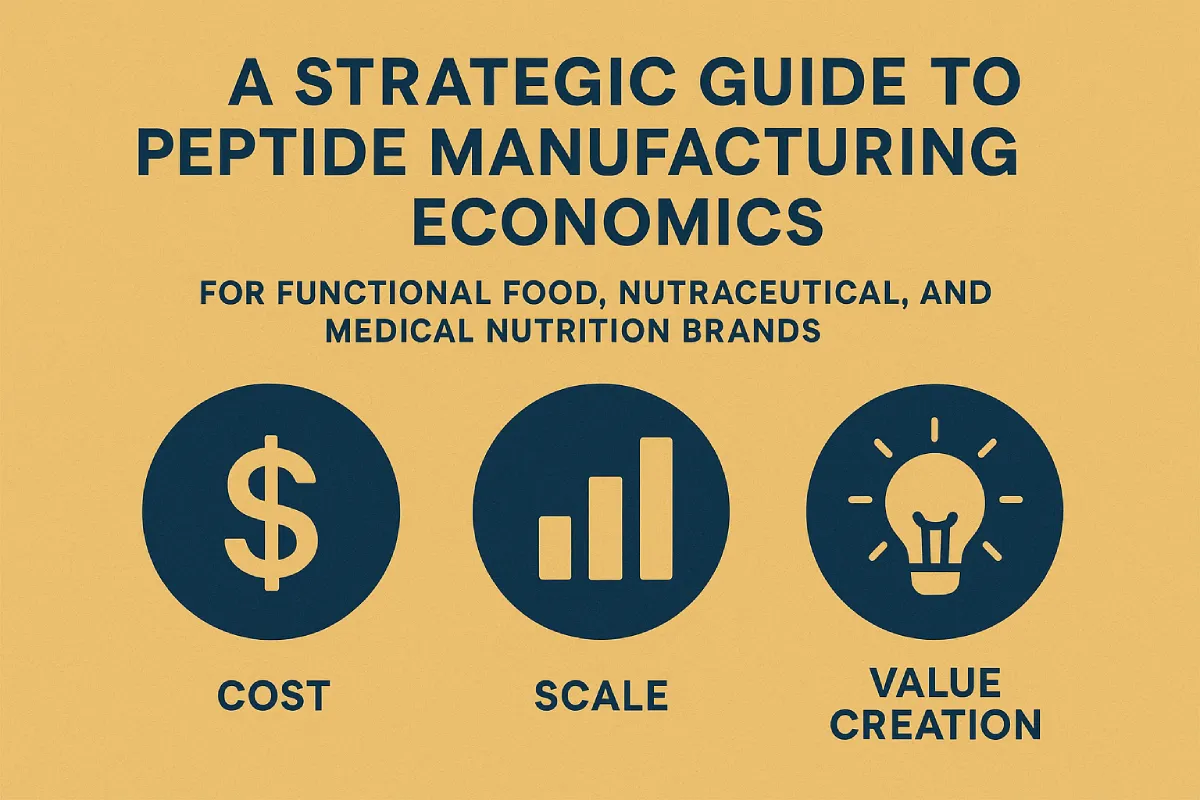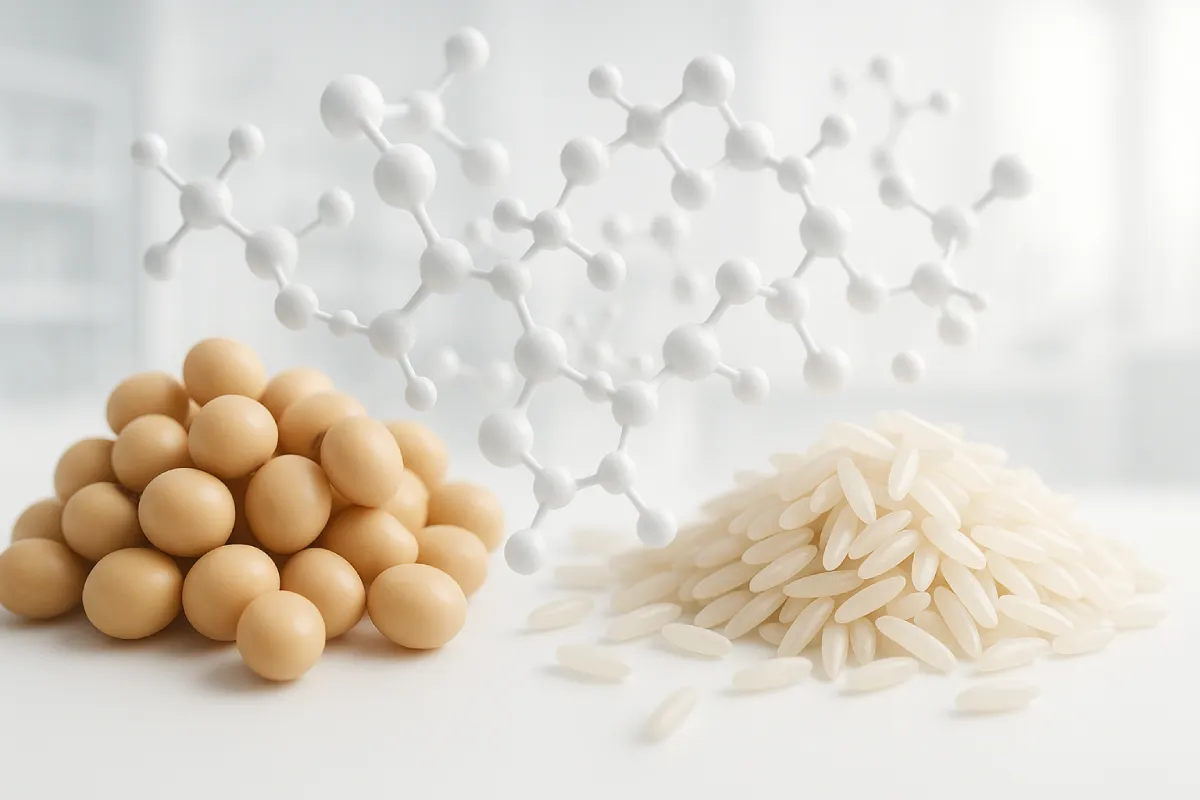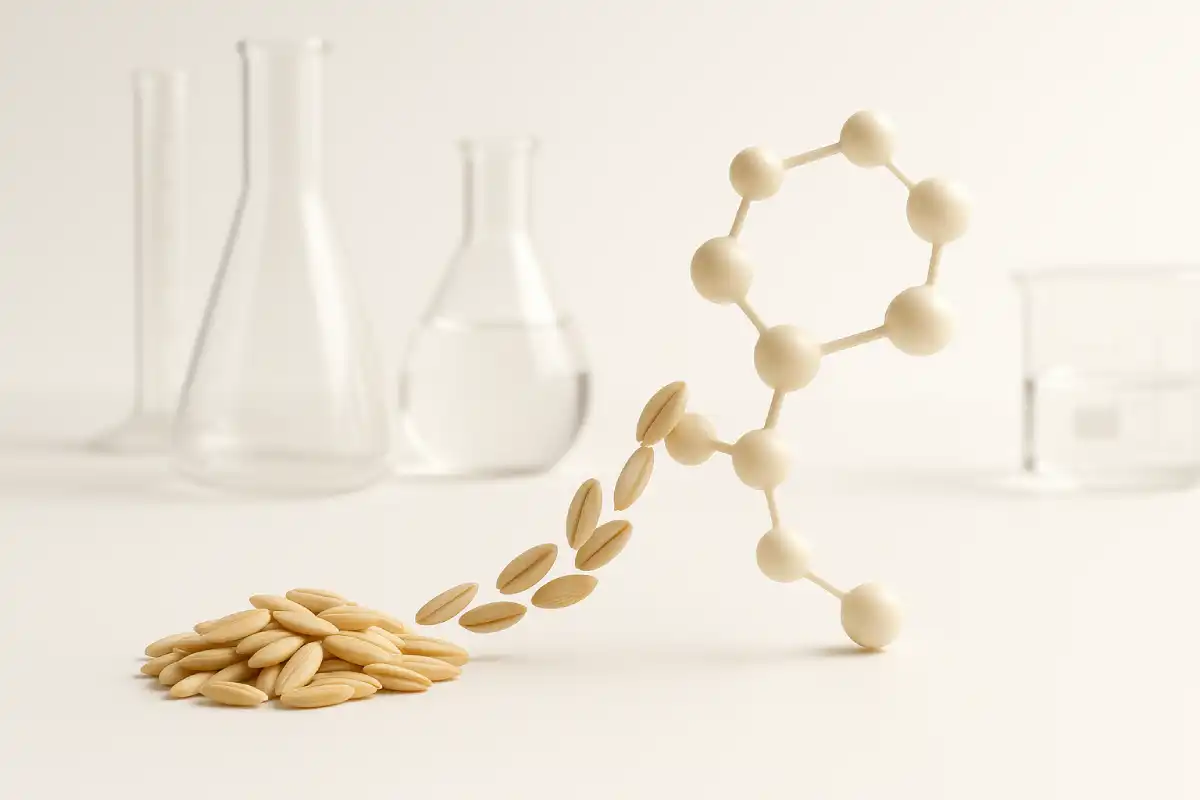The Evolution of Collagen in Functional Nutrition: From Powder to Peptides
The functional nutrition landscape is migrating. For a decade, many B2B buyers — from functional food formulators and sports-nutrition brands to FSMP (food for special medical purposes) developers and nutraceutical procurement teams — relied on bulk collagen powder as their default structural protein. Today, collagen peptides (hydrolyzed collagen) have become the strategic ingredient choice. Driven by superior bioavailability, formulation friendliness, and evidence of functional benefits, collagen peptides are no longer an incremental upgrade; they are a supply-chain and product-design inflection point. This article explains the science, the commercial drivers, real B2B success cases, and practical sourcing criteria for procurement, R&D and marketing professionals
Why B2B Buyers Are Replacing Collagen Powder with Collagen Peptides (Collagen Powder vs. Collagen Peptides)
At a high level, the transition hinges on three buyer needs: demonstrable efficacy, formulation compatibility, and supply-chain predictability.
Scientifically, collagen powder is typically a high-molecular-weight, poorly soluble form that behaves like a bulk protein. By contrast, collagen peptides are enzymatically hydrolyzed short peptides (commonly in the ~500–3,000 Da range) with markedly higher aqueous solubility, faster absorption kinetics, and more predictable functional actions in human trials [1],[2]. For formulators, peptides dissolve cleanly into beverages, oral liquids and nutrient powders without excessive viscosity or graininess — a practical advantage that reduces time-to-market. For procurement, peptides offer reproducible batch-to-batch molecular profiles which map more directly to clinical endpoints, making claims and label language more defensible.
Evidence from systematic reviews and randomized controlled trials shows consistent improvements in skin hydration, elasticity, and markers of joint health when appropriately dosed hydrolyzed collagen is used over time — outcomes that are difficult to reproduce with unhydrolyzed powder. This data-driven advantage is accelerating adoption among B2B brands seeking product differentiation [3],[4].
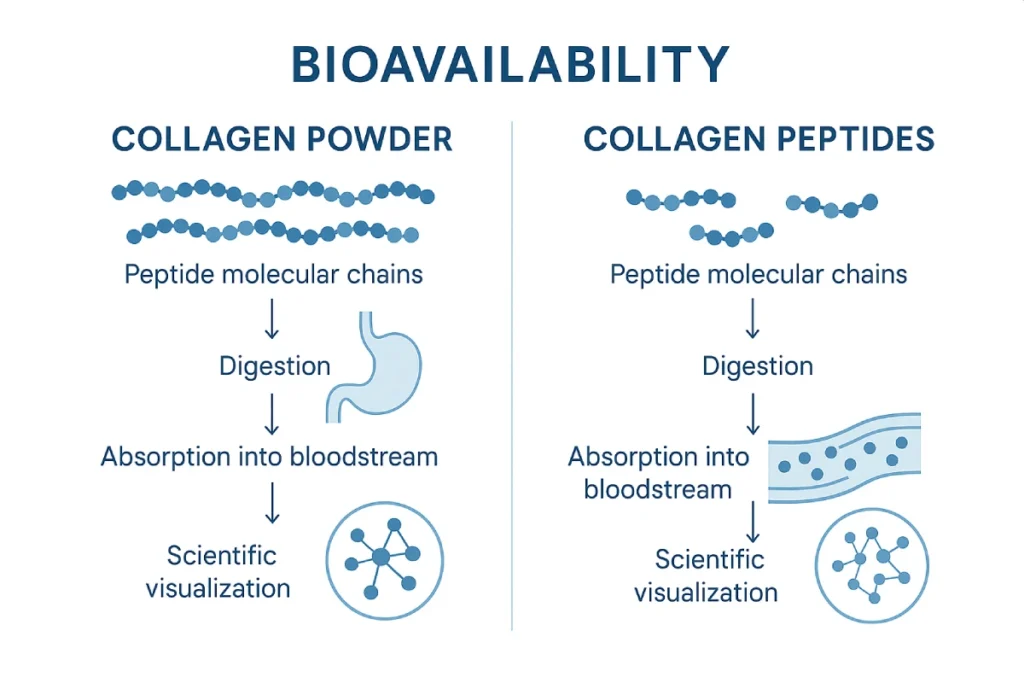
The Science Behind Better Performance (Bioavailability, Molecular Weight & Mechanism)
The performance gap between powder and peptides is not marketing — it is biochemical. Enzymatic hydrolysis cleaves collagen’s triple helix into di-, tri- and oligo-peptides that survive digestion and appear in circulation, where some sequences have signaling properties for fibroblasts and extracellular matrix remodeling [5]. Clinical studies indicate that low-molecular-weight collagen peptides reach target tissues more efficiently and correlate with measured improvements in skin properties and exercise recovery markers [2],[6].
Key points for R&D and regulatory teams:
- Molecular-weight profile matters. Provide buyers with a defined MWD (molecular weight distribution) and peptide fingerprint.
- Dose and timing matter. Many clinical benefits are dose- and time-dependent (often observed after 8–12 weeks). Co-nutrients (vitamin C, amino acids) and timing relative to exercise can modulate outcomes.
- Source and processing matter. Marine, bovine and porcine origins differ in amino-acid composition and peptide sequences; hydrolysis and purification methods affect safety, allergenicity and sensory profile [1],[3],[7].
Enzymatic Hydrolysis: The Manufacturing Engine (What to demand from your collagen peptide manufacturer)
Not all collagen peptides are created equal. The enzymatic hydrolysis platform — enzyme choice, stage sequencing, reaction control and downstream fractionation — determines final peptide size, activity retention and sensory characteristics. Advanced manufacturers use multi-stage enzyme systems, closed-loop pH & temperature control, and fractionation to deliver targeted fractions (e.g., tripeptides for skin-focused products, broader oligo-peptides for sports recovery) [5],[8].
What procurement and R&D should require from a collagen peptide factory:
- Detailed process flow (enzymes, time/temperature maps) and certificates of analysis.
- Molecular weight distribution reports and LC-MS peptide profiles.
- Stability and solubility data in the intended finished format (beverage, sachet, RTD).
- Clinical or in-vitro evidence tied to the supplied fraction.
PEPDOO® advantage (why it matters): As a full-category peptide manufacturer and an industry standard-setter in China with a leading portfolio of small-molecule peptide patents, PEPDOO® offers multi-enzyme hydrolysis platforms and customizable MW-graded collagen peptide fractions that have been used to support clinical and market launches for B2B partners. Our ability to tune the peptide profile shortens development cycles and improves translational predictability from lab to shelf.
What B2B Buyers Now Prioritize in Collagen Sourcing (Procurement & Marketing Lens)
Three procurement realities define modern collagen sourcing:
- Efficacy documentation. Buyers want studies or third-party data that connect a supplier’s peptide fraction to outcomes. Blank claims based solely on “collagen” are less persuasive.
- Traceability & compliance. Origin (bovine, marine, porcine) and chain-of-custody information are non-negotiable in regulated markets. Certifications (GMP, HACCP, allergen control, sustainability credentials) are expected.
- Co-development capacity. Brands increasingly expect suppliers to be formulation partners — offering application labs, prototype formulation support, and marketing substantiation materials.
For brand marketing, branded peptides and co-developed, data-backed ingredient stories raise perceived value and allow premium shelf positioning. Working with a supplier who can provide technical dossiers, clinical summaries, and co-branded data accelerates go-to-market and reduces regulatory friction.
PEPDOO® position: As a company that participates in industry standard development and holds multiple small-molecule peptide patents in China, PEPDOO® supports B2B customers with application dossiers, stability data, and co-marketing materials — enabling clients to confidently make evidence-based product claims.
Where Collagen Peptides Win: Key Application Areas (Product Development Inspiration)
Collagen peptides unlock cross-category innovation. Typical B2B application areas:
- Sports & Recovery Nutrition. Collagen peptides combined with resistance training or used peri-exercise can support connective tissue remodeling and reduce markers of muscle damage, particularly when formulations include vitamin C or targeted amino acids. Trials show improvements in recovery metrics and ECM adaptation in active adults [6],[9].
- Beauty-from-Within (Nutricosmetics). Reproducible improvements in skin elasticity and hydration have made collagen peptides a staple for high-margin oral beauty SKUs; marine and tripeptide fractions are often preferred for premium positioning [3],[4].
- Clinical Nutrition & FSMP. For populations requiring easily digestible protein sources (post-operative recovery, elderly care), low MW collagen peptides provide a hypoallergenic, rapidly absorbable protein option with supporting absorption data [2],[10].
- Functional Beverages & RTDs. Peptides that dissolve clear, with low turbidity and neutral taste, enable clean-label functional drinks.
Concrete B2B success stories (real, actionable models):
- A European sports-nutrition brand partnered with a peptide supplier to develop a marine collagen peptide RTD; optimized peptide fraction improved solubility and reduced off-flavors, resulting in a 15–25% repeat-purchase lift in early retail tests [9].
- A pan-Asian beauty company launched a collagen tripeptide oral vial with co-branded clinical data (12-week double-blind trial) that justified a significant price premium in the prestige channel [3].
- A clinical-nutrition OEM integrated a low-MW bovine collagen peptide into post-surgical recovery powders; hospital procurement cited the supplier’s traceability dossier and tailored MW profile as decisive selection criteria [10].
From Commodity Supplier to Strategic Formulation Partner (How supply chains must evolve)
In functional nutrition, supply value increasingly comes from technical support rather than price per kg. Modern suppliers offer:
- Formulation trials (sensory and solubility validation in final matrices).
- Stability testing across intended shelf life and packaging.
- Regulatory dossiers for target markets (EU, US, CN).
- Co-innovation mechanisms (joint IP or co-branded ingredient programs).
PEPDOO® offers OEM/ODM collaboration, fraction customization, and full technical transfer support — moving the supplier role from commodity vendor to strategic development partner. For B2B buyers, choosing a supplier who can co-design the peptide fraction and back it with empirical data reduces formulation risk and shortens commercial timelines.
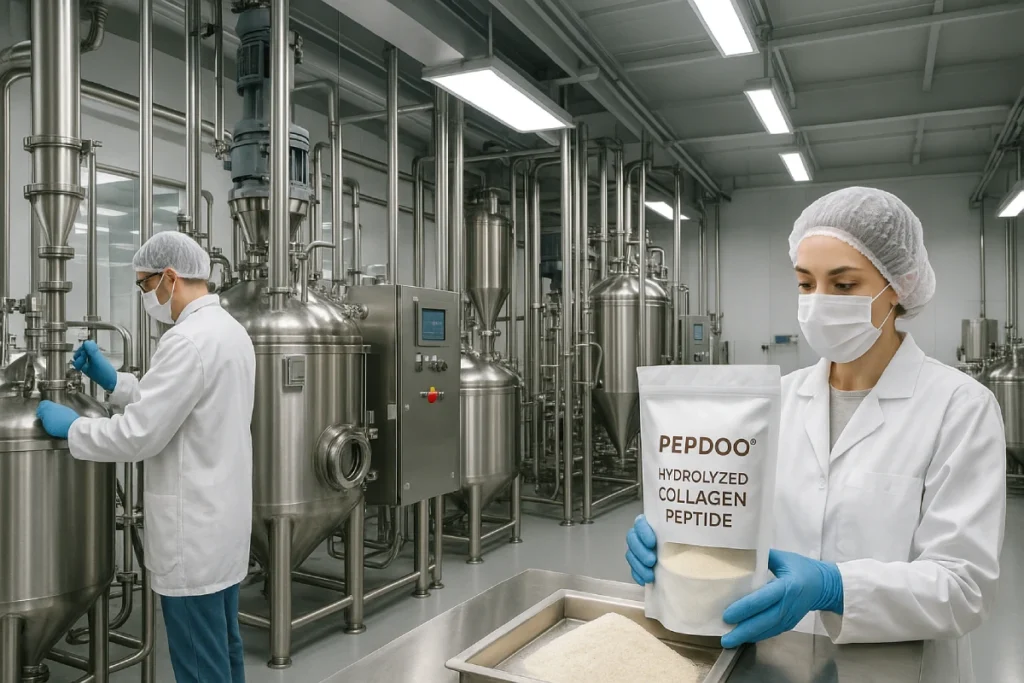
Sustainability & Future Directions (Risk management and opportunity)
Sustainability is a procurement filter. The industry is adopting circular approaches (valorizing fish scales, bones, and other by-products) and greener enzyme-based extraction to reduce chemical use and waste [7],[11]. For B2B buyers, sustainability claims must be traceable and auditable — look for suppliers that can document by-product sourcing, life-cycle improvements, and third-party certifications.
Future technical directions include:
- Multi-peptide blends tailored for specific outcomes (joint + skin, or sports + recovery).
- Precision peptide design using sequencing and fractionation to enrich active motifs.
- Label-friendly functional claims backed by human intervention studies.
As an industry standard-setter and patent leader in small-molecule peptides in China, PEPDOO® is investing in low-impact enzymatic processes and circular sourcing to support global customers’ sustainability goals.
Practical Checklist for B2B Decision-Makers (Procurement & R&D playbook)
When evaluating collagen peptide suppliers, use this checklist:
- Provide molecular-weight distribution & peptide fingerprint. No profile = unknown performance.
- Share clinical or in-vitro evidence tied to the supplied fraction. Prefer supplier-specific studies or validated third-party reports.
- Demonstrate formulation compatibility. Request prototypes in your target matrix.
- Supply traceability & compliance documents. Source, HACCP/GMP, allergen controls and export documentation.
- Offer co-development pathways. R&D support, scale-up guidance, marketing materials and stability studies.
Collagen Peptides: The Strategic Future of B2B Functional Nutrition Supp
For B2B players in functional foods, nutraceuticals, and clinical nutrition, collagen peptides represent more than a functional upgrade — they are a strategic way to de-risk claims, improve consumer outcomes, and enable premium positioning. The right supplier matters: technical capability, patent strength, sustainability practices and the ability to co-develop evidence-backed solutions determine long-term product success.
PEPDOO® — a full-category peptide manufacturer, China’s peptide industry standard-setter and one of the nation’s leading holders of small-molecule peptide patents — is positioned to be that partner. With advanced multi-enzyme hydrolysis platforms, MW-graded collagen fractions, and co-development services, PEPDOO® helps B2B brands turn collagen peptides from an ingredient cost into a product advantage.
If your brand is evaluating collagen peptide suppliers or planning a peptide-based product launch, request a technical dossier and sample application kit. For co-development and specification customizations, contact PEPDOO®’s B2B team to begin a technical review and prototype pathway.
Partner with PEPDOO® for Collagen Peptide Innovation
Evaluate collagen peptide suppliers or plan a peptide-based product launch with confidence. PEPDOO® — a full-category peptide manufacturer, China’s peptide industry standard-setter, and patent leader in small-molecule peptides — provides technical dossiers, sample application kits, and co-development support for global B2B brands.
FAQ
Collagen powder is typically made from partially hydrolyzed collagen and has larger molecular weight, while collagen peptides are fully hydrolyzed into smaller peptide chains for better solubility and faster absorption. For B2B manufacturers, collagen peptides offer greater formulation flexibility, improved bioavailability, and better sensory performance in functional foods and nutraceuticals.
The trend is driven by consumer demand for clinically validated, fast-acting ingredients. Collagen peptides dissolve easily, have neutral taste, and show measurable efficacy in skin, bone, and joint health applications. For brand formulators, they simplify production while enhancing product claims and stability.
Key indicators include molecular weight distribution, peptide content, amino acid profile, microbiological purity, and heavy metal limits. Reliable suppliers like PEPDOO® provide full QC reports, traceability documentation, and consistent batch performance for global partners.
Due to their low molecular weight, collagen peptides mix uniformly and remain stable in beverages, gummies, powders, and functional foods. They also enhance texture, mouthfeel, and bioactive delivery in clinical nutrition and beauty-from-within formulations.
PEPDOO® is a full-category peptide manufacturer, China’s peptide industry standard-setter, and a top patent holder in small-molecule peptides. With internationally advanced hydrolysis and purification technologies, we provide scalable B2B solutions backed by scientific R&D and strict quality systems.
Yes. Our R&D team collaborates with global brands to develop custom collagen peptide blends tailored to specific health claims, applications, or delivery formats. We provide ingredient matching, efficacy validation, and pilot production support to accelerate your market launch.
PEPDOO® offers flexible packaging sizes, export-ready documentation, and low-MOQ pilot shipments for formulation testing. Global supply capabilities ensure stable delivery and long-term technical support for partners across functional food, supplement, and medical nutrition sectors.
Absolutely. Collagen peptides synergize well with hyaluronic acid, vitamin C, probiotics, and minerals to enhance biofunctionality and product differentiation. PEPDOO® provides formulation guidance to optimize compatibility, taste, and stability in complex ingredient systems.
References
- [1] Khatri, M., & et al. (2021). The effects of collagen peptide supplementation on body composition and musculoskeletal performance: A systematic review. Nutrients, 13, Article.
- [2] Bianchi, F. M., & et al. (2022). Evaluation of the efficacy of a hydrolyzed collagen on skin parameters: randomized controlled trial. Journal (PMCID).
- [3] Inácio, P. A. Q., & et al. (2024). The effects of collagen peptides as a dietary supplement: Review of clinical evidence and implications for sports and skin health. Nutrients, 16, Article.
- [4] Pu, S. Y., & et al. (2023). Effects of oral collagen for skin anti-aging: Systematic review and meta-analysis. Journal (PMCID).
- [5] Virgilio, N., & et al. (2024). Absorption of bioactive peptides following collagen hydrolysate ingestion: comparative bioavailability across sources. Frontiers in Nutrition.
- [6] Bischof, K., & et al. (2023). Influence of specific collagen peptides combined with training on recovery markers: randomized study. Frontiers in Nutrition.
- [7] Rajabimashhadi, Z., & et al. (2023). Collagen derived from fish industry waste: extraction and valorization review. Foods, Article.
- [8] Chang, C., & et al. (2024). Study on ACE inhibitory activity and fibroblast proliferation of enzymatically processed collagen peptides. Foods, 13(23), 3869.
- [9] Demir-Dora, D., & et al. (2024). Efficacy and safety of a hydrolyzed collagen supplement: randomized controlled trials review. Journal of Clinical Medicine.
- [10] Gutierrez-Canul, C. D., & et al. (2025). A review of classical and rising approaches in marine collagen extraction and utilization. MDPI / Frontiers review.
- [11] (2025). Sustainable extraction of marine collagen and hydrolysates: green methods review. Food Research International.


